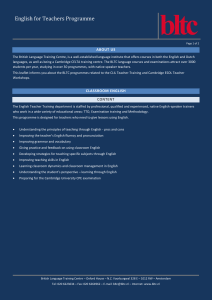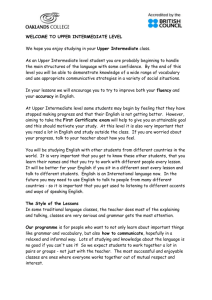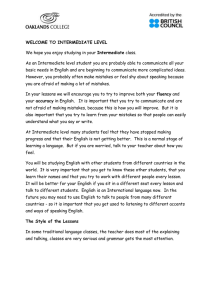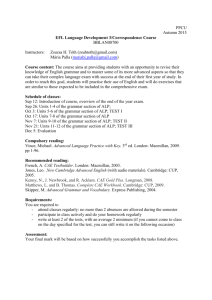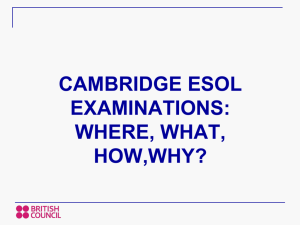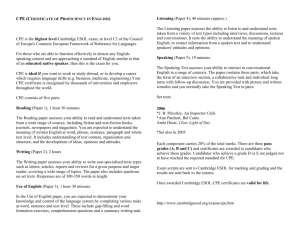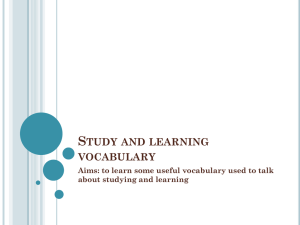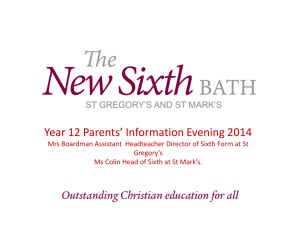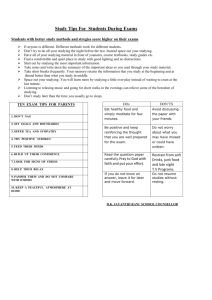Advanced English Course Information
advertisement
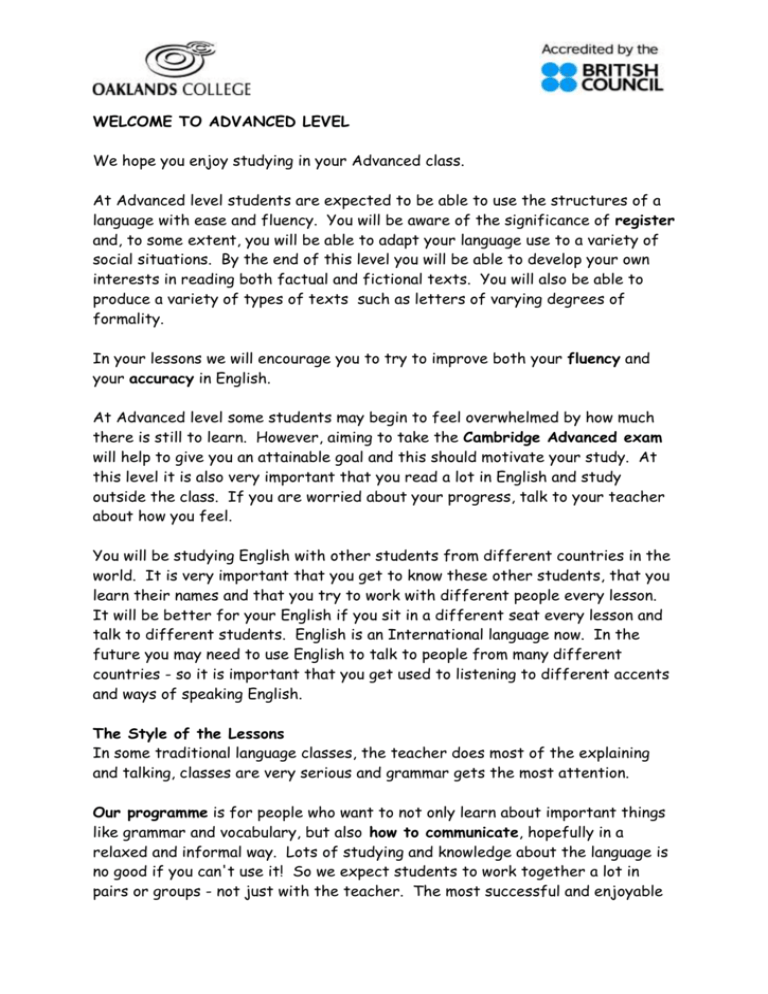
WELCOME TO ADVANCED LEVEL We hope you enjoy studying in your Advanced class. At Advanced level students are expected to be able to use the structures of a language with ease and fluency. You will be aware of the significance of register and, to some extent, you will be able to adapt your language use to a variety of social situations. By the end of this level you will be able to develop your own interests in reading both factual and fictional texts. You will also be able to produce a variety of types of texts such as letters of varying degrees of formality. In your lessons we will encourage you to try to improve both your fluency and your accuracy in English. At Advanced level some students may begin to feel overwhelmed by how much there is still to learn. However, aiming to take the Cambridge Advanced exam will help to give you an attainable goal and this should motivate your study. At this level it is also very important that you read a lot in English and study outside the class. If you are worried about your progress, talk to your teacher about how you feel. You will be studying English with other students from different countries in the world. It is very important that you get to know these other students, that you learn their names and that you try to work with different people every lesson. It will be better for your English if you sit in a different seat every lesson and talk to different students. English is an International language now. In the future you may need to use English to talk to people from many different countries - so it is important that you get used to listening to different accents and ways of speaking English. The Style of the Lessons In some traditional language classes, the teacher does most of the explaining and talking, classes are very serious and grammar gets the most attention. Our programme is for people who want to not only learn about important things like grammar and vocabulary, but also how to communicate, hopefully in a relaxed and informal way. Lots of studying and knowledge about the language is no good if you can't use it! So we expect students to work together a lot in pairs or groups - not just with the teacher. The most successful and enjoyable classes are ones where everyone works together out of mutual respect and interest. In the lesson you will do different activities. Sometimes you will: work in pairs or groups with other students work alone talk/listen to the teacher. It is important that you take an active part in all these stages. The structure of the course In your classes we may follow a course book to give you a basic structure to the course but we will use a lot of other materials and give you a lot of worksheets. So you will need to bring a file to class to organise your work and notes. In your lessons we will practise the 4 skills of: speaking writing, reading, listening You will learn a lot of new vocabulary and expressions that you need to write down and to practise regularly. Sometimes in class you will be learning new things about English. But often you will be practising language that you have studied before but do not yet use well. In the middle of the Autumn and Spring terms you will have a progress test which will help to show you how your English is going. Attendance and punctuality This is important! You need to attend classes regularly. If you can't come to class it is best to ask another student to collect handouts for you and to tell you about any homework. Although everyone has commitments and occasional problems, good attendance means good punctuality too. Everyone (including your teacher!) is expected to be on time for classes! Students MUST attend regularly. If you miss 10% of your hours in class in a 2week period the College will expect a good reason for your absence. If there is no satisfactory explanation and attendance does not improve you will be given a final warning. Should attendance continue to be a problem, we will ask you to leave. In class We all get hungry sometimes during classes, but eating is not allowed in any class on the campus. Not only is it distracting, but it often results in a mess for the next class and even problems with insects. Homework You should expect to be given some homework after most classes. You don't need to do it, but you will make much faster progress if you do. If you don't do homework, you may find that some of the next lesson is wasted on you. You should expect to get your homework back no more than a week after giving it to your teacher. Exams Not everyone wants or needs to do an exam, but at the end of this level you should be ready to take the Cambridge Advanced exam. This exam can be taken in December of June, although you will need to register with Cambridge and pay for the exam 2-3 months before you take it. What next? Normally you will need to study at Advanced level for at least 3 terms before you will be ready to take the exam. You can always talk to your teacher about your progress. Can I take CPE in the Advanced level? Yes, the Advanced class covers a wide range of language and can prepare students to take the CPE exam. WE HOPE YOU ENJOY YOUR COURSE Course objectives ADVANCED Summary Appropriate examination: Cambridge CAE/CPE At the end of this level students will be able to use the structures of English with ease and fluency. They will be aware of the significance of register. This means that to some extent they will be able to adapt their language use to a variety of social situations, express opinions and take part in discussions and arguments in a culturally acceptable way. They will be able to use language in a creative and flexible way, with the ability to respond appropriately to unforeseen as well as predictable situations, producing quite long and complex utterances. Students can study part-time or full time. For more information on the exams and available resources, please go to the Cambridge ESOL website http://www.cambridgeesol.org/exams/cae/index.html http://www.cambridgeesol.org/exams/cpe/index.html Speaking By the end of this level students will have no problems in dealing with many of the routine situations of everyday life. They can take part in lengthy casual conversations and discuss abstract or cultural topics fluently and with a good range of expression. Nuances of meaning and opinion are not beyond their grasp, but there may still be difficulties when talking about sensitive or complex issues. Students will be able to argue a point persuasively. They can contribute effectively to meetings and seminars within their own area of work, give a presentation or demonstration and use the telephone for most business purposes. Writing At the end of this level students will be able to write informal letters, only encountering difficulties where very complex issues arise and they will be able to produce some of the more formal types of letters such as a letter to a newspaper. In the workplace they will be able to deal with routine requests for goods and services but may need help to deal with a situation which demands tact or delicacy. Students who have completed this level are likely to be able to follow a course of academic study at university level. They will be able to write an essay, although errors of grammar and vocabulary, as well as style, may well occur. Reading At the end of this level students will be able to understand magazine and newspaper articles, although complex plots, arguments and humour may present difficulties. Students will be able to understand instructions, articles and reports as long as, in most of these cases, the topic area is within the learners own field and no particularly complex concepts and arguments or unusual vocabulary are involved. If studying, reading will present problems only when abstract or metaphorical language and cultural allusions are frequent. However, the user will still have difficulty getting through the amount of reading required on an academic course, and may not be able to cope with postgraduate study. Listening Students at this level will have sufficient competence in comprehension to take part in a variety of casual conversations. They will be able to understand a great deal of what is available on TV and radio and in plays and films, but complex plots and detailed arguments will escape them. They will be able to understand most of what takes place in meetings and seminars within their own area of work. They can follow arguments unless they are very complex . Students at this level will be able to follow much of what is said in a lecture, demonstration or presentation, seminar or tutorial, although unfamiliar accents, cultural allusions and jokes, unfamiliar or complex subject matter and colloquial language may cause difficulties. Typical grammar Overview of tenses including stative vs dynamic verbs Reduced relative clauses e.g. ‘E-mails sent today will be read tomorrow’ Contrast of conjunctions ‘Despite’, ‘In spite of’, ‘Although’, ‘Whereas’, ‘While’ Use of ‘However, ‘ and ‘Nonetheless’ Gerunds and infinitives with change of meaning Mixed conditionals Past tenses to talk about hypothetical situations e.g. ‘I wish’, ‘If only’, ‘would rather/sooner’, ‘It’s time you…’, ‘Supposing …’ Contrast between ‘need’, ‘ought’, ‘should’, ‘must’ Varied uses of the passive Analysis of the grammar of multi-word verbs Contrast of ‘No sooner’, ‘Scarcely’, ‘Barely’, ‘Hardly’ Typical topic and vocabulary areas Travel The environment Different stages of life Culture Business Current affairs Disasters Health Education Politics For a more detailed overview of the syllabus, go to: https://www.teachers.cambridgeesol.org/ts/digitalAssets/117579_Cambridg eEnglish_Advanced__CAE__Handbook.pdf https://www.teachers.cambridgeesol.org/ts/digitalAssets/118532_CE_Profic iency_Handbook_2013_update.pdf
